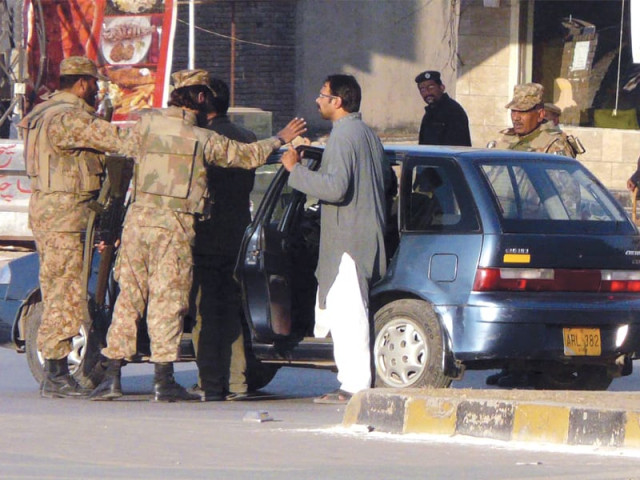Rawalpindi curfew : Profiteers run amok as lockdown continues
Residents of Raja Bazaar, Urdu Bazaar and Purana Qila have no access to food, medicines.

The army continued enforcing the curfew (top) while shoppers struggled to get daily food items amid astronomical price hikes. PHOTOS: INP
As the curfew imposed in Rawalpindi to control the simmering sectarian tension was extended for a second day on Sunday, residents found themselves in a tight spot.
The provincial government, meanwhile, has asked the residents to stay indoors and refrain from any public gatherings.
Caught unaware by the curfew clamped down at midnight on Saturday, most residents found themselves out of food and essential supplies on Sunday.
With some parts of the city in complete lockdown and most major markets closed, replenishing the supplies proved to be an uphill task for the residents.

Mian Fakhar, 60, walked to Marir Hassan market with his friends after they had tried their luck in Saddar, where they live, to find breakfast food items, but failed to get anything.
“Every single shop in Saddar is closed,” said Fakhar, an employee at the Secretariat building that houses the Ministry Of Defence in Rawalpindi cantonment. “We ran out of food yesterday and were hoping to find at least some tea and rusk at the Marir dhabas.”
In Potohar Town, one of Rawalpindi’s two administrative sub-units, the curfew was relatively relaxed and people had freedom to move in the streets and opened shops within their neighbourhoods. However, shoppers were greeted by astronomical rises in prices of essential commodities.
Profiteers tripled the rates of groceries, much to the frustration of the buyers who were already hard-pressed to get food for their homes.
“I just bought a dozen eggs for Rs300,” said Muhammad Usman, a student, who lives near Panjsarki Road, indicating that the price of eggs showed around a 250 per cent increase from the regular Rs84 per dozen.
“This is the height of shamelessness. Shopkeepers are exploiting consumers even in such a critical situation,” Usman said.
Teabags that used to cost Rs5 were being sold for Rs20 at some shops and the price of potatoes increased threefold to reach Rs130 per kilo.
Other essential food items such flour and milk were already in short supply because supply centres were closed and trucks carrying goods were not being allowed to move in the city.

At a small general store right next to the Leh Bridge in Dhok Chiraghdin, Sohail Ahmed, the shop’s manager, said he had run out of flour to sell.
“The flour distribution agent says he is not going to risk his life going out in the curfew to get more flour,” Sohail said.
But things were worse in Rawal Town, the area which includes the site of Friday’s mob violence and market arson, where the army has not allowed people to step outside since Saturday.
There, in areas such as Raja Bazar, Urdu Bazar, Purana Qila and Ganj Mandi, people had no access to food and medical supplies. Even hospitals located inside the curfew zone were running out of food and medicines for patients.
Usman said that he had relatives in the inner city but he had not been able to reach them because in certain places even landlines were not functioning properly. He said that the administration should at least resume cellular services. Phone services were, however, resumed in the city from around 7:30 pm to 12am.
Residents also criticised the district administration for not providing any emergency contact numbers or alternative means of transport. The Rawal Town area had remained in lockdown even during a three-hour relaxation in curfew on Saturday night, some residents claimed.
District administration officials were not available to respond to either the criticism or to the questions as who would be responsible if people in Rawal Town faced a medical emergency or a food crisis.
Meanwhile, all main entry and exit points of Rawalpindi remained sealed on Sunday. Air travellers were only allowed to from Islamabad and surrounding areas if they produced valid tickets at the Koral Chowk check post near Benazir Bhutto International Airport.
The residents said that the Friday incident was a direct consequence of the intolerance rampant in society. They said that they wished the groups which clashed on Friday at the Ashura procession would find a peaceful solution so the curfew could be lifted.
“People have stopped being kind to each other,” said Fakhar, who has spent most of his 60 years in Rawalpindi. “We need to have more tolerance and good manners in society.”
Published in The Express Tribune, November 18th, 2013.



















COMMENTS
Comments are moderated and generally will be posted if they are on-topic and not abusive.
For more information, please see our Comments FAQ